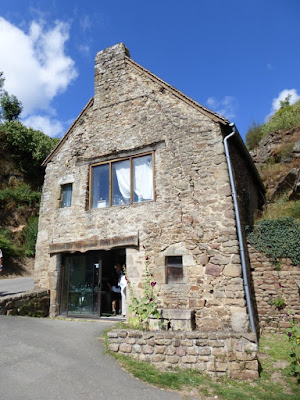There was little information on the church, almost none in English, so I can only speculate on it. From the design I'd guess it was originally a chapel, very old, then a nave was added, and more, sometime in the Gothic period. The painting is pretty primitive, reminding us more of the monastery chapels we saw in Cappadocia than anything else. One has to guess these paintings have been restored over the centuries. But they are credibly primitive, at least to me. So that's my analysis. The whole thing is convincingly old and, of course, altered over the centuries.
 |
| St. Ceneri parish church |
 |
| In the nave, Stations of the Cross |
 |
| Done by a local artist |
 |
| Mary's flock; you can just barely see the blue of her cloak... |
 |
| Pantokrator in His Mandorla thing |
 |
| Perhaps Arcimboldo passed through sometime in the 16th century |
 |
| Old barrel vaulting |
 |
| Chancel, altar |
 |
| North transept, as it were |
 |
A bit of sculpture...St. Ceneri (he was an Italian hermit monk
who settled here in the 9th century and worked the usual
wonders and miracles)? |
 |
| More painting |
 |
Now in the south transept; maybe Vlad Dracula passed
through in the 15th century |
 |
| Smallest stained glass window ever, so far |
 |
| Outside now |
 |
St. Ceneri's is famous for its bees...in 898 Charles the Simple's army passed through
and some of its soldiers performed some sacrilege at the chapel; they were revealed
by their bee stings (my translation); hmmm...the chapel doesn't look quite that old |
 |
Anyhow, there they are, still buzzing, threateningly, after all these centuries;
prone to sacrilege as I am, I kept my distance |
 |
Now back down in town, we came across the studio of the
artist who did the Stations... |
 |
| I liked his stuff |



























































